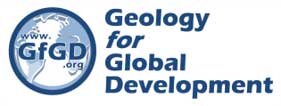Strategy Report 2017-2021
Our work from 2017 until recently was guided by four strategic objectives summarised by the words 'inspiration, education, action, and leadership' (download our 2017-21 strategy here). To address these, we delivered high-quality activities with valued, international partners. Examples of our primary achievements are set out below.
Being at the forefront of efforts to grow understanding of the role of geoscience in the UN Sustainable Development Goals.
Through a suite of publications, presentations, our online presence, and engagement at conferences we contributed to a much broader understanding of the value of geoscience in supporting sustainable development. To date, more than 17,500 people accessed our article on 'Geology and the SDGs' (published in 2017). This was quoted at the open session of the UNESCO International Geoscience Programme Council meeting in 2019 as informing the refocusing of their activities.
More recently, our book on 'Geosciences and the Sustainable Development Goals' was published, involving 42 authors from across six continents. This is the most comprehensive analysis of the role of geoscientists in delivering the 2030 Agenda with more than 10,000 accesses in its first 15 months.
Equipping thousands of geoscience students with the content- and skills-based knowledge required to contribute to implementation of the SDGs.
We organised conferences each year from 2013 to 2019, on themes including tackling poverty (SDG 1), improving water management (SDG 6), sustainable cities (SDG 11), and good health and wellbeing (SDG 3). Each gathered more than 100 people and generated overwhelmingly positive feedback. Our engagement with students in other contexts - most notably through our network of University Groups - means students across dozens of institutes have had an opportunity to reflect on how they can contribute to sustainable development and do so in an ethical and effective way.
To further support this, we published a fully open-access educational module on ‘Geoscience and Sustainable Development’ in 2020. The module includes eight classes, collectively helping learners to develop skills-for-sustainability, and was supported by the International Union of Geological Sciences (IUGS) and the UNESCO/IUGS International Geoscience Programme Project 685.
Advancing research to support implementation of the Sustainable Development Goals.
A project focusing on 'geoscience education for sustainable development' in Kenya' supports efforts to address SDG 4 (targets 4.4 and 4.7) by building understanding of the skills required for future employment to deliver sustainable development objectives. Research on barriers preventing NGOs in eastern Africa (including Tanzania and Uganda) from accessing geoscience knowledge to inform clean water programmes supports efforts to address SDG 6 (target 6.1), access to safe and affordable drinking water for all.
Our approach to projects contributes to a strengthened national scientific capacity in many contexts, an ambition of SDG 9 (target 9.5). This has been done by funding postgraduate-level research and networking opportunities for early-career geoscientists from Malawi, Uganda, and Kenya, supporting scientific conferences in Guatemala, and providing resources to institutions in Bangladesh, Kenya, Zambia, Sierra Leone, Tanzania, and India. Our approach has contributed to North-South and South-South cooperation on and access to science, described in SDG 17 (target 17.6).
Strengthening the geoscience-policy interface, improving geoscience representation in international policy processes and mechanisms.
Until recently there was a significant gap in terms of engagement by the geoscience community in international conversations around science and sustainable development. Working with relevant UN Major Groups to amplify our messages, we contributed to three UN Forums on Science, Technology, and Innovation for the SDGs (convening the first Earth science focused side event), the High-Level Political Forum on Sustainable Development, and the 26th Conference of the Parties to the UN Framework Convention on Climate Change (UNFCCC). In 2021, the UNFCCC formally accepted our application to become an observer organisation, and the UN Economic and Social Council (ECOSOC) recently granted us special consultative status. Through engaging at this level, we ensured text around the value of geodiversity was included in the Scientific and Technological Major Group position paper for the 2021 High Level Political Forum, and key messages about environmental education were embedded into the formal report of the UN Forum on Science, Technology, and Innovation for the SDGs.
You can find more about our activities and achievements from 2017 to 2021 in our annual reports over this period (https://www.gfgd.org/annual-reports). The 2021 report (to be uploaded soon) includes a broader look back at this strategy period, and the extent to which we delivered against the strategic objectives we set in 2017.
We are confident that, because of our work, there is greater recognition and understanding of the role of geoscience in tackling significant global challenges both within and beyond the geoscience community. This change in knowledge, together with new skills, supports the wider geoscience community to make their own contribution to practical development projects (through diverse professional roles), tackling the scourge of poverty and multiple inequalities. The impact on implementation of the SDGs of a mobilised and equipped community will always exceed what we - as one organisation - can do.
Through our approach, expertise, and presence in global forums and networks we have become a recognised and trusted voice on ‘geoscience and sustainable development’, with a demonstrated commitment to reshaping the global geoscience community to better serve society. We increased representation of geosciences in spaces that previously lacked a voice for geoscience.
Through all we have achieved to date, we are uniquely positioned to ensure the geoscience community is engaged in the SDGs and to work with the UN on the development of any subsequent frameworks.
We recognise, however, that there is still much to do to leverage maximum impact from the work we have initiated, and that there remain many barriers to the effective use of geoscience information in delivery of the SDGs.
We look forward to continuing our work to address these issues through our new strategy - to be released soon - and hope many of those reading this report, within and beyond the geoscience community, will partner with us to achieve it.





